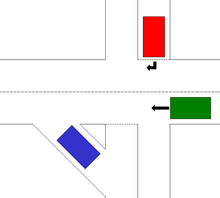Slip lane
A slip lane or slip road is a road traffic lane provided at an intersection to allow vehicles to turn at the intersection without actually entering it and interfering with through traffic. It is therefore not controlled by any traffic signals at that intersection. There are two types of slip lane - those where the lane continues into its own lane in the road which it turns into and those where the lane terminates at the point where it enters the road turned into.[1]

Risks
Slip lanes are a dangerous design element, and therefore controversial in urban and suburban contexts - many cities are therefore actively removing them. [2] Slip lanes may need to be removed if considerations such as pedestrian safety grow to a point where they over-ride the desire to facilitate free passage for cars.[3][4]
To minimise risks of collision, slip lanes can be shaped to enter the traffic flow at a higher angle than the 45 degrees shown in the first sketch. Such lanes are called high entry angle slip lanes.[5]
Australia
In Australia cars exiting a slip lane must give way to all other traffic even when that traffic is faced with a give-way or other traffic controls.[6]
See also
References
- "Pedestrians crossing slip lanes" (PDF). Main Roads Western Australia. September 2002. Retrieved 8 November 2015.
- "Cities Are Replacing Dangerous Slip Lanes With Space for People". Streetsblog. July 2018. Retrieved 4 June 2019.
- "City Road Draft Master Plan" (PDF). Melbourne City Council. July 2015. Retrieved 8 November 2015.
- "Slip Lanes be gone". Matt L. 2 October 2015. Retrieved 8 November 2015.
- "Guidelines for the signing and layout of slip lanes" (PDF). NZ Transport Agency. November 1993. Retrieved 9 May 2017.
- http://www.cota-act.org.au/Livedrive/road_rules.html